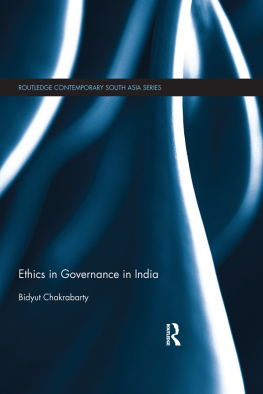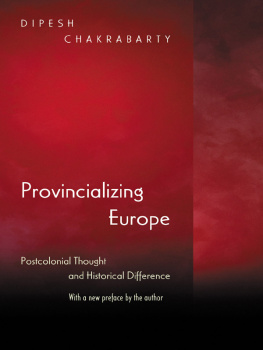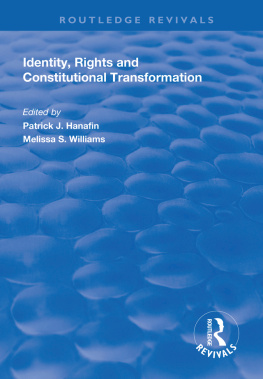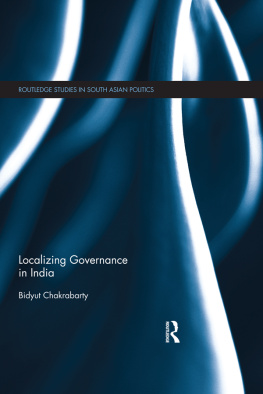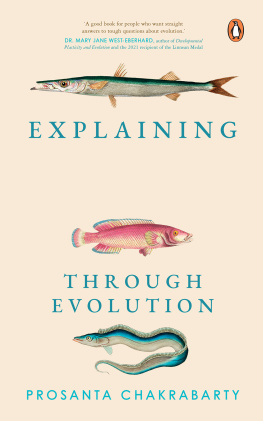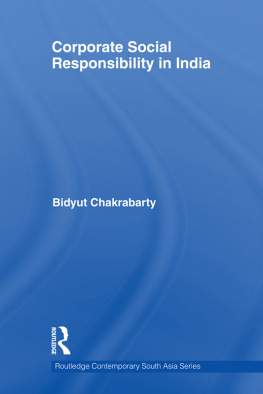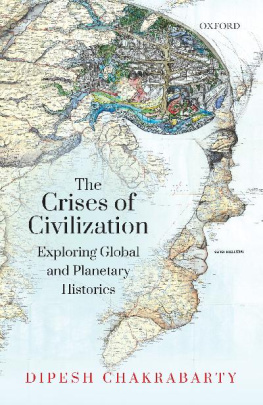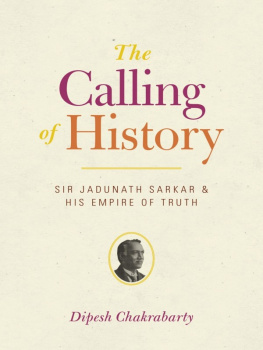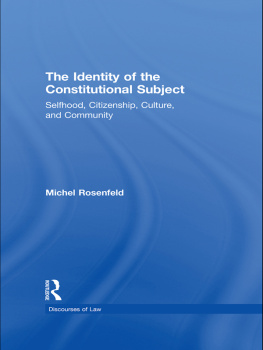Chakrabarty - India’s constitutional identity : ideological beliefs and preferences
Here you can read online Chakrabarty - India’s constitutional identity : ideological beliefs and preferences full text of the book (entire story) in english for free. Download pdf and epub, get meaning, cover and reviews about this ebook. City: New York, Abingdon, year: 2019, publisher: NY, Oxon, Routledge., genre: Politics. Description of the work, (preface) as well as reviews are available. Best literature library LitArk.com created for fans of good reading and offers a wide selection of genres:
Romance novel
Science fiction
Adventure
Detective
Science
History
Home and family
Prose
Art
Politics
Computer
Non-fiction
Religion
Business
Children
Humor
Choose a favorite category and find really read worthwhile books. Enjoy immersion in the world of imagination, feel the emotions of the characters or learn something new for yourself, make an fascinating discovery.

- Book:India’s constitutional identity : ideological beliefs and preferences
- Author:
- Publisher:NY, Oxon, Routledge.
- Genre:
- Year:2019
- City:New York, Abingdon
- Rating:5 / 5
- Favourites:Add to favourites
- Your mark:
- 100
- 1
- 2
- 3
- 4
- 5
India’s constitutional identity : ideological beliefs and preferences: summary, description and annotation
We offer to read an annotation, description, summary or preface (depends on what the author of the book "India’s constitutional identity : ideological beliefs and preferences" wrote himself). If you haven't found the necessary information about the book — write in the comments, we will try to find it.
India’s constitutional identity : ideological beliefs and preferences — read online for free the complete book (whole text) full work
Below is the text of the book, divided by pages. System saving the place of the last page read, allows you to conveniently read the book "India’s constitutional identity : ideological beliefs and preferences" online for free, without having to search again every time where you left off. Put a bookmark, and you can go to the page where you finished reading at any time.
Font size:
Interval:
Bookmark:
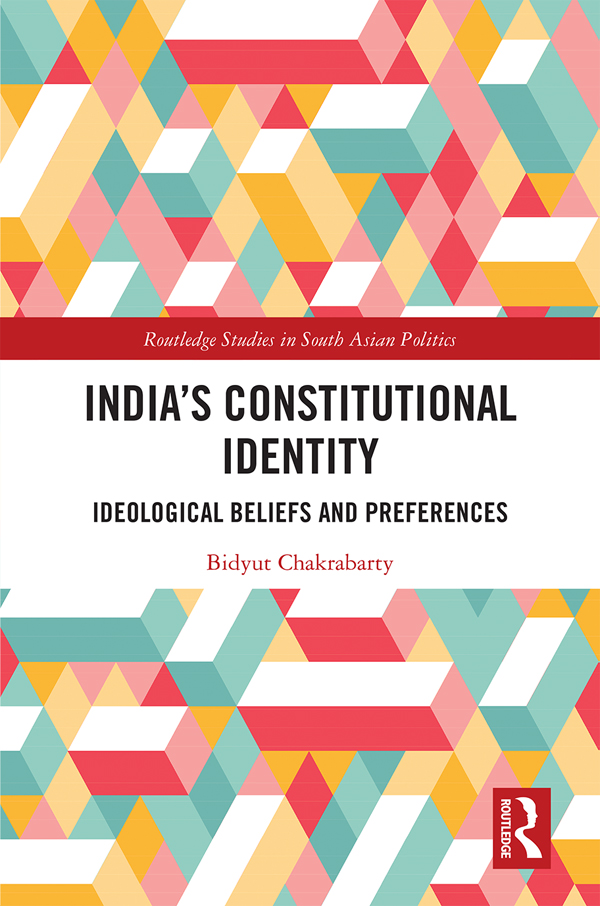
Indias Constitutional Identity
An analysis of selective aspects of Indias constitutional identity, this book provides an analytical account of the changing and changed texture of Indias constitutional identity bearing in mind the historical context in which it is articulated.
The book conceptualizes the gradual evolution of an idea by tracing the history of Indias constitutionalism with reference to its conceptual roots, historical antecedents and the landmark judicial pronouncements in which the concern for its retention and protection is always privileged. The author examines specific constitutional designs that the 1950 Constitution of India put in place and argues that constitutional identity, despite being drawn on specific constitutional provisions, is also changeable in view of the rapidly transforming socio-economic milieu. He demonstrates that there are numerous instances where Indias constitutional identity has undergone a metamorphosis in circumstances where newer politico-ideological values and norms are privileged.
A valuable addition to the literature on constitutionalism and constitutional practices in general and their manifestation in Indias democratic experiences, in particular, this book will be of interest to academics in the fields of Government, Political Science, Law and Jurisprudence, Constitutional and Legal History and Asian Studies.
Bidyut Chakrabarty is Vice Chancellor of Visva Bharati University, Santiniketan, West Bengal, India. He is the author of numerous books on Indian Politics and Gandhi. His most recent monograph is Localizing Governance in India, also published by Routledge (2017). His research interests include Public Administration, Indian Politics, Indian Political Thought and Movement and the Indian Nationalist Movement.
Routledge Studies in South Asian Politics
11 Government and Politics in Sri Lanka
Biopolitics and Security
A. R. Sriskanda Rajah
12 Politics and Governance in Bangladesh
Uncertain Landscapes
Edited by Ipshita Basu, Joe Devine and Geoffrey Wood
13 Constitutional Democracy in India
Bidyut Chakrabarty
14 Radical Politics and Governance in Indias North East
The Case of Tripura
Harihar Bhattacharyya
15 The Security State in Pakistan
Legal Foundations
Syed Raza
16 The Socio-political Ideas of BR Ambedkar
Liberal constitutionalism in a creative mould
Bidyut Chakrabarty
17 The Politics of US Aid to Pakistan
Aid Allocation and Delivery from Truman to Trump
Murad Ali
18 Indias Constitutional Identity
Ideological Beliefs and Preferences
Bidyut Chakrabarty
For more information about this series, please visit: https://www.routledge.com/asianstudies/series/RSSAP
Indias Constitutional Identity
Ideological Beliefs and Preferences
Bidyut Chakrabarty

First published 2019
by Routledge
2 Park Square, Milton Park, Abingdon, Oxon OX14 4RN
and by Routledge
52 Vanderbilt Avenue, New York, NY 10017
Routledge is an imprint of the Taylor & Francis Group, an informa business
2019 Bidyut Chakrabarty
The right of Bidyut Chakrabarty to be identified as author of this work has been asserted by him in accordance with sections 77 and 78 of the Copyright, Designs and Patents Act 1988.
All rights reserved. No part of this book may be reprinted or reproduced or utilised in any form or by any electronic, mechanical, or other means, now known or hereafter invented, including photocopying and recording, or in any information storage or retrieval system, without permission in writing from the publishers.
Trademark notice: Product or corporate names may be trademarks or registered trademarks, and are used only for identification and explanation without intent to infringe.
British Library Cataloguing-in-Publication Data
A catalogue record for this book is available from the British Library
Library of Congress Cataloging-in-Publication Data
Names: Chakrabarty, Bidyut, 1958- author.
Title: India, democracy and constitutional identity : ideological beliefs and preferences / Bidyut Chakrabarty.
Description: Abingdon, Oxon ; New York, NY : Routledge, 2019. |
Series: Routledge studies in South Asian politics ; 18 | Includes bibliographical references and index.
Identifiers: LCCN 2018054387 (print) | LCCN 2019004722 (ebook) | ISBN 9780429507175 (ebook) | ISBN 9780429016530 (adobe reader) | ISBN 9780429016516 (mobipocket) | ISBN 9780429016523 (epub) | ISBN 9781138580701 (hbk) | ISBN 9780429507175 (ebk)
Subjects: LCSH: Constitutional history--India. | India--Politics and government--1947- | Democracy--India.
Classification: LCC KNS1760 (ebook) | LCC KNS1760 .C435 2019 (print) | DDC 342.5402/9--dc23
LC record available at https://lccn.loc.gov/2018054387
ISBN: 978-1-138-58070-1 (hbk)
ISBN: 978-0-429-50717-5 (ebk)
Typeset in Times New Roman
by codeMantra
Dedicated to those fighting for justice amidst adversaries
Indias Constitutional Identity: ideological beliefs and preferences is a sequel to other books that I have recently published. There are three books which can be said to have provoked me to write the present one, namely Constitutional Democracy in India (Routledge, Oxford, 2018), Constitutionalizing India: An Ideational Project (Oxford University Press, New Delhi, 2018) and The Socio-Political Ideas of BR Ambedkar: Liberal Constitutionalism in a Creative Mould (Routledge, Oxford, 2019). Needless to say, I have drawn on them, rather liberally, because I believe that building one argument over another helps one to develop a mega-argument, which is useful to explore mega social processes and formations. My academic exercises, undertaken so far, have convinced me that one of the most persuasive ways of meaningful explorations is to approach themes from the conceptual point of view. One needs to be little careful here because concepts by themselves may not be always helpful since they are also context-driven. Hence, they may not have, for obvious reasons, universal applications; nonetheless, they provide useful inputs to comprehend themes which are intertwined in social, economic and political processes in similar circumstances. India is a good example. Given the long duration of colonial rule, it is conceptually apt to argue that colonial system of constitutionalism cannot be ignored while theoretically grasping Indias constitutional identity. It is equally true that the nationalist interventions also remained a significant source of conceptualization. A persuasive explanation is thus possible only by comprehending the dialectical interconnections between these multiple influences stemming from the prevalent socio-economic and political milieu. I have endeavoured to analytically dissect the processes that finally led to the rise and consolidation of a specific kind of constitutional democracy in India which is, simultaneously, both derivative and indigenous.
There is a further caution: despite being thematically more or less similar, my books on constitutionalism seek to capture the multifaceted character of its growth and strengthening in India. It is true that BR Ambedkar along with his colleagues who held identical views contributed significantly to the creation of a liberal democratic polity in India. Equally true is the contention that he, despite being opposed to Gandhis widely hyped notion of village swaraj, had to accommodate the demands of the Gandhians for including panchayati raj governance in the 1950 Constitution; furthermore, he had to step down and was forced to give up his demand for gender equality when his friends championing liberal values did not back him when he was in favour of adopting the 1951 Hindu code Bill. These descriptive details are indicative of the complex processes contributing to Indias constitutional identity, which cannot be conceptualized in a neat theoretical format as it is enmeshed in the equally far more complex social, economic and political realities. Similarly, the argument that Indias constitutional identity is derivative of the philosophy of Enlightenment gains credence in view of the contribution that the British liberals made in creating circumstances in favour of liberal democracy. This is the theme of my
Font size:
Interval:
Bookmark:
Similar books «India’s constitutional identity : ideological beliefs and preferences»
Look at similar books to India’s constitutional identity : ideological beliefs and preferences. We have selected literature similar in name and meaning in the hope of providing readers with more options to find new, interesting, not yet read works.
Discussion, reviews of the book India’s constitutional identity : ideological beliefs and preferences and just readers' own opinions. Leave your comments, write what you think about the work, its meaning or the main characters. Specify what exactly you liked and what you didn't like, and why you think so.

